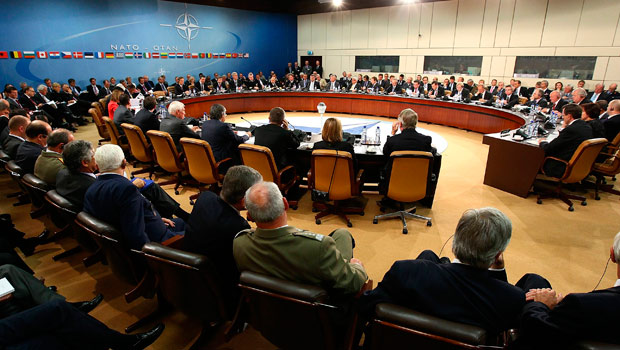In a speech before the meeting, US Defense Secretary Leon Panetta urged NATO member states to cooperate more closely and pool their resources in order to make up for the shortfalls that have plagued the alliance’s operations in Libya and Afghanistan.
“It would be a tragic outcome if the alliance shed the very capabilities that allowed it to successfully conduct these operations,” said Panetta, who is making his first visit to Europe after taking over from Robert Gates as Pentagon chief in July.
European members and Canada provided most of the strike aircraft used in the Libya campaign. But the war exposed shortages in their capabilities in strategic transport, aerial surveillance, air refueling, and unmanned drones, most of which had to be supplied by the US.
With the Pentagon facing $450 billion in budget cuts over the next 10 years, allies can’t assume that the US will be able to continue covering their shortcomings, Panetta said in a speech to the Brussels-based organization Carnegie Europe.
But there is little appetite in Europe for more spending on boosting such capabilities when defense budgets are being slashed as part of public spending cuts and other austerity measures designed to deal with the impact of the economic crisis.
The ministerial conference in Brussels is the first in a series of preparatory meetings by allied defense and foreign ministers in the run-up to NATO’s summit in May in Chicago.
Ministers have praised the operation in Libya, which enabled Muammar’s Qaddafi’s opponents to oust his autocratic regime. It has been cited as proof that the Cold War alliance remains relevant to international security.
“Our operation to protect civilians in Libya has been a great success,” NATO Secretary-General Anders Fogh Rasmussen said.
NATO warplanes have flown nearly 25,000 sorties, including more than 9,000 strike missions, since the strikes began in March.
The campaign also revealed deep rifts within the Western military alliance. Only eight of the 28 members participated, while the others stayed away — mostly for fear of how the new mission would affect the alliance’s commitment to Afghanistan.
Before stepping down as Pentagon chief, Gates bluntly criticized NATO for what he said were shortages in military spending and political will, warning of “a dim if not dismal future” for the alliance unless European members boosted their participation.
But diplomats said Panetta was not expected to continue with such a confrontational attitude.
In Afghanistan, NATO’s troops and the government’s security forces are still struggling against Taleban insurgents, whom they outnumber by about 15 to 1. Some 130,000 NATO troops are currently fighting in Afghanistan; more than 2,700 NATO troops have died in the war.
High-profile Taleban attacks this year have undermined NATO’s claim that it has the upper hand, and the United Nations released a report last month saying the monthly level of violence in the country was significantly higher than in 2010.
The US and NATO began transferring security responsibilities this year to newly trained Afghan forces with the goal of withdrawing all their combat troops by the end of 2014.
Fogh Rasmussen said the transition remains “fully on track” and that Afghan forces are already providing lead security for one-quarter of the population.
“I expect the next stage of transition to be announced soon, and I expect it to be substantial,” he said Monday. “And at the same time, our military authorities assess that the insurgency has been weakened overall.”
Other issues at the two-day NATO meeting will include the situation in Kosovo, where intercommunal clashes continue nearly 12 years after an alliance bombing campaign ended Serbia’s rule there, and anti-piracy patrols off Somalia, stretching into a third year after a three-month authorization period in 2008.
Officials said they want at least one of these three missions — Libya, Kosovo or Somalia — to conclude successfully, quickly and for good.










